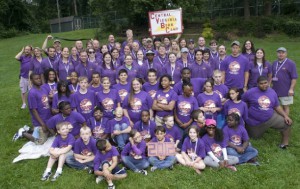Cathy Rogers didn’t know her son was making flamethrowers in the woods with his friends until he got burned.

Nothing had gone wrong the first couple of times they tried it but one afternoon, Jacob was trying to poke a hole in a can of spray paint and spilled it into a fire behind him. The flames flared and Jacob’s arms caught fire. After his friends threw dirt on him to try to put it out, Jacob ran back to his house screaming “bloody murder like crazy,” Cathy recalls.
Her son was burned on parts of his face, neck, arms, hands and legs. He had to have a skin graft on his right hand and arm, taken from his thigh. He was in the hospital at UVA for over two weeks and missed about two months of school.
But something good came out of the horrible pain. Jacob, now 18, was invited to attend Central Virginia Burn Camp at Camp Holiday Trails the summer after his accident and is set to be a counselor-in-training this year, his third summer.
Fun, Self-Esteem for Burn Survivors
Each year, the camp brings together about 40 kids from all over Virginia who have one thing in common: They were burned badly enough to require medical treatment, usually hospitalization. The week-long camp is free of charge and free from the stares and questions that accompany them throughout the rest of the year. Jacob’s scars can be covered by sleeves, but many aren’t so lucky.
“The focus of camp is to provide a fun camp experience so these kids can be with other kids who have gone through what they’ve gone through,” says camp director Leslie Baruch. “The camp’s positive, supportive environment helps foster a sense of self-confidence, increases self-esteem and allows these children to realize they’re not alone with their burn scars.”
The activities — everything from a ropes course to a Kings Dominion trip to fishing — are often new experiences for the campers. Some kids need help with the activities, like holding onto ropes, because of scars or other physical limitations, but Baruch, an occupational therapist at UVA, believes assisting is a good learning experience for everyone. “You hear the kids say, ‘I’ll hold this and you do that,’ without being asked. It’s really cool how they work together.”
Finding Community and Healing
Ultimately, Baruch believes the experience improves the kids’ self-esteem, giving them confidence that gets them through the other 51 weeks of the year. About 2/3 of campers come back; some, like Jacob, end up becoming counselors-in-training and counselors.
This will be counselor Renny Light’s 6th year at camp. She was burned during a sledding accident when she was a teenager and still has scars on her face. Before her first week at camp, she thought she was the only teen in her area who’d been burned.
“I didn’t know there were so many people who had gone through it,” she says. “It was a week where I could get away from what I’m used to and be with people who I share a common bond with.”
Jacob agrees and says only his fellow campers can really understand what he went through. “It’s the worst pain you could ever feel,” he says. “Most people have accidentally touched the stove, and it hurts for hours … but to feel part of your body getting burned to the point where you need a skin graft, I can’t even describe it.”
Twenty Summers of Volunteering
Baruch became involved with the camp after she moved to Charlottesville in 1987 and visited a similar camp in North Carolina. She began working with two burn care nurses at UVA, one of whom was married to a professional firefighter. Through him, the Charlottesville Professional Firefighters became involved and donated enough money to hold a 3-day, 2-night camp with six kids.
2013 will be the camp’s 20th year, and Baruch is there every year. Firefighters from throughout Virginia continue to provide financial support. UVA, United Way contributions, and many other friends, sponsors, and associated businesses also help fund the camp. It remains free for the campers.
Want to Go to Camp?
This year’s camp is June 9-15. It’s open to kids ages 7-17 who live in Virginia and the surrounding states and are burn survivors. Teachers and healthcare providers often refer campers.
Applications are due May 1 for campers and April 15 for counselors.